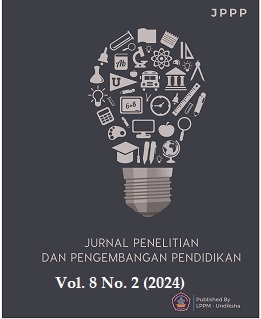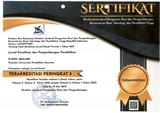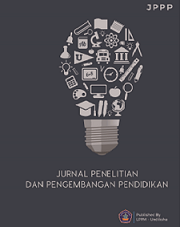Guided Inquiry Method and Self-Efficacy on High School Students' Physics Learning Outcomes
DOI:
https://doi.org/10.23887/jppp.v8i2.68657Keywords:
Guided Inquiry Method, Self-Efficacy, Learning OutcomesAbstract
A change in the learning paradigm is needed to develop a scientific attitude to form students who are creative, critical, open, innovative, and competitive. This study aims to analyze the effect of the guided inquiry learning method and self-efficacy on students' physics learning outcomes. This research is true experimental research that compares the application of the guided and free inquiry methods. This study involved 70 students from 2 classes selected by simple random sampling. The instruments used in this study were self-efficacy questionnaires and student learning outcomes. The data collected were then analyzed descriptively and inferentially using SPSS 20. The results showed that applying the inquiry method and self-efficacy influenced students' physics learning outcomes. Applying the guided inquiry method and high student self-efficacy resulted in high learning outcomes. Conversely, they applied the free inquiry method with low self-efficacy, which resulted in low learning outcomes. However, there was no interaction between the inquiry method and self-efficacy.
References
Akuba, S. F., Purnamasari, D., & Firdaus, R. (2020). Pengaruh Kemampuan Penalaran, Efikasi Diri dan Kemampuan Memecahkan Masalah Terhadap Penguasaan Konsep Matematika. JNPM (Jurnal Nasional Pendidikan Matematika), 4(1), 44. https://doi.org/10.33603/jnpm.v4i1.2827. DOI: https://doi.org/10.33603/jnpm.v4i1.2827
Amijaya, L. S., Ramdani, A., & Merta, I. W. (2018). Pengaruh Model Pembelajaran Inkuiri Terbimbing Terhadap Hasil Belajar Dan Kemampuan Berpikir Kritis Peserta Didik. Jurnal Pijar Mipa, 13(2), 94–99. https://doi.org/10.29303/jpm.v13i2.468. DOI: https://doi.org/10.29303/jpm.v13i2.468
Bandura, A. (1977). Self-efficacy : Toward a Unifying Theory of Behavioral Change. 84(2), 191–215. DOI: https://doi.org/10.1037//0033-295X.84.2.191
De Backer, L., Van Keer, H., De Smedt, F., Merchie, E., & Valcke, M. (2022). Identifying regulation profiles during computer-supported collaborative learning and examining their relation with students’ performance, motivation, and self-efficacy for learning. Computers and Education, 179. https://doi.org/10.1016/j.compedu.2021.104421. DOI: https://doi.org/10.1016/j.compedu.2021.104421
Dewi, N. L., Dantes, N., & Sadia, I. W. (2019). Pengaruh Model Pembelajaran Inkuiri Terbimbing Terhadap Hasil Belajar IPA. Jurnal Penelitian dan Pengembangan Pendidikan, 3(2), 122. https://doi.org/10.23887/jppp.v3i2.17390. DOI: https://doi.org/10.23887/jppp.v3i2.17390
Hamidah, Nur Haryani, S., & Wardani, S. (2018). Efektivitas Lembar Kerja Peserta Didik Berbasis Inkuiri Terbimbing untuk Meningkatkan Hasil Belajar Siswa. Jurnal Inovasi Pendidikan Kimia, 12(2), 2212 – 2223. https://doi.org/https://doi.org/10.15294/jipk.v12i2.7460.
Hasbullah, A. H., Parno, P., & Sunaryono, S. (2020). Efikasi Diri Siswa Dalam Pembelajaran Proyek Berbasis STEM pada Materi Termodinamika. Jurnal Pendidikan: Teori, Penelitian, dan Pengembangan, 5(3), 421. https://doi.org/10.17977/jptpp.v5i3.13325. DOI: https://doi.org/10.17977/jptpp.v5i3.13325
Ikbal, M. S., Nurhayati, N., & Ahmad, Y. (2018). Pengaruh Metode Guided Inquiry Dan Pengetahuan Operasi Dasar Matematika Dalam Praktikum Fisika Dasar Terhadap Pemahaman Konsep Fisika Mahasiswa Pendidikan Fisika UIN Alauddin Makassar. Al-TA’DIB: Jurnal Kajian Ilmu Kependidikan, 11(1), 19–36. https://doi.org/10.31332/atdb.v11i1.943.
Juniati, N. W., & Widiana, I. W. (2017). Penerapan Model Pembelajaran Inkuiri untuk Meningkatkan Aktivitas dan Hasil Belajar IPA pada Siswa Kelas V. Jurnal Ilmiah Sekolah Dasar, 2(12), 20–29. https://doi.org/10.17977/jptpp.v2i12.10315. DOI: https://doi.org/10.23887/jisd.v1i1.10126
Kurniawan, A., Rahmiati, D., Marhento, G., Suryani, N. Y., Jalal, N. M., Daniarti, Y., Kasmawati, Wigati, E., Harum, A., Nugroho, A. A., Supadmi, Syamiya, E. N., Yunarti, T., Utami, S., Hudiah, A., & Artiani, L. E. (2022). Metode Pembelajaran dalam Student Centered Learning (SCL). Wiyata Bestari Samasta.
Lestari, H. (2020). Peningkatan Pemahaman Nature of Science (Nos) Siswa Melalui Model Pembelajaran Inkuiri Terbimbing Ditinjau Dari Tingkat Efikasi Diri. Reslaj : Religion Education Social Laa Roiba Journal, 2(2), 228–250. https://doi.org/10.47467/reslaj.v2i2.146. DOI: https://doi.org/10.47467/reslaj.v2i2.146
Lovisia, E. (2018). Pengaruh Model Pembelajaran Inkuiri Terbimbing terhadap Hasil Belajar. Science and Physics Education Journal (SPEJ), 2(1), 1–10. https://doi.org/10.31539/spej.v2i1.333. DOI: https://doi.org/10.31539/spej.v2i1.333
Lusidawaty, V., Fitria, Y., Miaz, Y., & Zikri, A. (2020). Pembelajaran IPA dengan Strategi Pembelajaran Inkuiri untuk Meningkatkan Keterampilan Proses Sains dan Motivasi Belajar Siswa di Sekolah Dasar. Jurnal Basicedu, 4(1), 168–174. https://doi.org/10.31004/basicedu.v4i1.333. DOI: https://doi.org/10.31004/basicedu.v4i1.333
Maharani, R., Marsigit, M., & Wijaya, A. (2020). Collaborative learning with scientific approach and multiple intelligence: Its impact toward math learning achievement. Journal of Educational Research, 113(4), 303–316. https://doi.org/10.1080/00220671.2020.1806196. DOI: https://doi.org/10.1080/00220671.2020.1806196
Mukti, B., & Tentama, F. (2019). Faktor-Faktor Yang Mempengaruhi Efikasi Diri Akademik. Prosiding Seminar Nasional Magister Psikologi Universitas Ahmad Dahlan, 0(0), 341–347. https://seminar.uad.ac.id/index.php/snmpuad/article/view/3442.
Muthmainna, A. (2021). Pengaruh Lokus Pengendalian, Efikasi Diri dan Sikap Ilmiah Terhadap Hasil Belajar Fisika Siswa. Dahzain Nur : Jurnal Pendidikan, Keislaman Dan Kemasyarakatan, 10(2), 27–38. https://e-journal.staiyapistakalar.ac.id/index.php/DahzainNur/article/view/8.
Ningsih, W. F., & Hayati, I. R. (2020). Dampak Efikasi Diri Terhadap Proses & Hasil Belajar Matematika (The Impact Of Self-Efficacy On Mathematics Learning Processes and Outcomes). Journal on Teacher Education, 1(2), 26–32. https://doi.org/10.31004/jote.v1i2.514. DOI: https://doi.org/10.31004/jote.v1i2.514
Perdana, F. A., Sarwanto, & Sukarmin. (2017). Keterampilan Proses Sains untuk Meningkatkan Kemampuan Berpikir Kritis dan Motivasi Belajar Siswa SMA/MA Kelas X pada Materi Dinamika Gerak. INKUIRI: Jurnal Pendidikan IPA, 6(3), 61–76. https://doi.org/10.20961/inkuiri.v6i3.17844. DOI: https://doi.org/10.20961/inkuiri.v6i3.17844
Rodriguez, J. M. G., Hunter, K. H., Scharlott, L. J., & Becker, N. M. (2020). A Review of Research on Process Oriented Guided Inquiry Learning: Implications for Research and Practice. Journal of Chemical Education, 97(10), 3506–3520. https://doi.org/10.1021/acs.jchemed.0c00355. DOI: https://doi.org/10.1021/acs.jchemed.0c00355
Roesitiyah, N. K. (2008). Strategi Belajar Mengajar. Rineka Cipta.
Rustan, E., & Rachmat, S. (2024). Cultural Context as the Basis for Developing Reading Game Applications. International Journal of Instruction, 17(1), 133–156. https://doi.org/10.29333/iji.2024.1718a. DOI: https://doi.org/10.29333/iji.2024.1718a
Sofiani, E. (2011). Pengaruh model inkuiri terbimbing (guided inquiry) terhadap hasil belajar fisika siswa pada konsep listrik dinamis. UIN Jakarta.
Sugiarta, G. P. O., Widiana, I. W., & Tastra, I. D. K. (2016). Penerapan Model Pembelajaran Inkuiri Berbasis Portofolio untuk Meningkatkan Hasil Belajar IPA Siswa Kelas V. E-Journal PGSD Universitas Pendidikan Ganesha, 6(3), 1–10. https://doi.org/10.23887/jjpgsd.v4i3.8600.
Sujana, I. G. (2020). Meningkatkan Hasil Belajar IPA Melalui Penerapan Metode Inkuiri Terbimbing. Journal of Education Action Research, 4(4), 514. https://doi.org/10.23887/jear.v4i4.28651. DOI: https://doi.org/10.23887/jear.v4i4.28651
Thaha, H., & Rustan, E. (2017). Orientasi Religiusitas dan Efikasi Diri dalam Hubungannya dengan Kebermaknaan Pendidikan Agama Islam pada Mahasiswa IAIN Palopo. Jurnal Studi Agama dan Masyarakat, 13(2), 163–179. https://doi.org/10.23971/jsam.v13i2.551. DOI: https://doi.org/10.23971/jsam.v13i2.551
Violadini, R., & Mustika, D. (2021). Pengembangan E-Modul Berbasis Metode Inkuiri pada Pembelajaran Tematik di Sekolah Dasar. Jurnal Basicedu, 5(3), 1210–1222. https://doi.org/10.31004/basicedu.v5i3.899. DOI: https://doi.org/10.31004/basicedu.v5i3.899
Widodo, R. I., & Kurniawan, D. A. (2021). Mendeskripsikan Tingkat Efikasi Diri Pada Siswa SMAN 6 Batanghari Terhadap Pembelajaran Fisika. Prosiding Seminar Nasional Fisika 7.0, 0, 117–122. http://proceedings.upi.edu/index.php/sinafi/article/view/1818.
Wu, H., Li, S., Zheng, J., & Guo, J. (2020). Medical students’ motivation and academic performance: the mediating roles of self-efficacy and learning engagement. Medical Education Online, 25(1). https://doi.org/10.1080/10872981.2020.1742964. DOI: https://doi.org/10.1080/10872981.2020.1742964
Yang, Q., Chen, Q., Wang, J., & Ou, R. (2022). The effect of student self-efficacy on learning outcomes in a business simulation mobile game: a quasi-experimental study. Library Hi Tech. https://doi.org/10.1108/LHT-02-2022-0114. DOI: https://doi.org/10.1108/LHT-02-2022-0114
Yasmini, N. M. (2022). Metode Inkuiri Terbimbing untuk Meningkatkan Hasil Belajar IPA Siswa Kelas V. Journal of Education Action Research, 6(1), 73. https://doi.org/10.23887/jear.v6i1.44013. DOI: https://doi.org/10.23887/jear.v6i1.44013
Downloads
Published
How to Cite
Issue
Section
License
Copyright (c) 2024 Sulfa Riben, Muhammad Arsyad, Helmi Helmi

This work is licensed under a Creative Commons Attribution-ShareAlike 4.0 International License.
Authors who publish with the Jurnal Penelitian dan Pengembangan Pendidikan agree to the following terms:
- Authors retain copyright and grant the journal the right of first publication with the work simultaneously licensed under a Creative Commons Attribution License (CC BY-SA 4.0) that allows others to share the work with an acknowledgment of the work's authorship and initial publication in this journal.
- Authors are able to enter into separate, additional contractual arrangements for the non-exclusive distribution of the journal's published version of the work (e.g., post it to an institutional repository or publish it in a book), with an acknowledgment of its initial publication in this journal.
- Authors are permitted and encouraged to post their work online (e.g., in institutional repositories or on their website) prior to and during the submission process, as it can lead to productive exchanges, as well as earlier and greater citation of published work. (See The Effect of Open Access)








